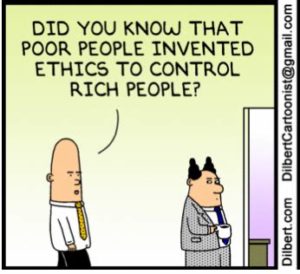Whither Goest Our Moral Imperative?
Posted by Laura Otten, Ph.D., Director on August 9th, 2018 in Thoughts & Commentary
0 comment
National Democratic Committee Future Forum Pentacost Rev. William BarberIn an address to the National Democratic Committee Future Forum in January 2017, Rev. William Barber, II made the following statement: “…there are times when a deep, moral crisis demands that the way we have framed things up until now is insufficient.”
He was speaking of the need for an American political Pentecost and a movement away from a world view of “right” versus “left” and towards a world view of “right” versus “wrong,” a moral fusion that crosses the usual suspects of boundaries people like to use to divide, Boundaries of race and religion, socioeconomic status and education, and the like. But he could have been speaking about the nonprofit sector in 2018.
Some say our sector has lost its way, forgetting why, individually and collectively, we exist. Perhaps, in part this is due to an IRS that has allowed what, at times, seems like everyone and anyone to become a charity so that there are charities that never should have been created as such. But, there are also groups that correctly deserve their charitable status despite the fact that many in our sector abhor everything they represent. Ironically, that has been the beauty, and very essence of our country, what our Constitution and Bill of Rights were created to protect, and now what too many, some even organized as nonprofits, seek to change. But is it not our sector’s job to make sure this doesn’t happen?
Despite the fact that nonprofits do not reflect one voice, one perspective, that we are as diverse as this country, we have accepted the responsibility of working toward a “better” world. Each and every one of our organizations, when initially established, and then regularly reaffirmed with each form we complete and send to the IRS and the attorneys’ general of our respective states, promises to work on behalf of some portion of the public good. And though, clearly, the 1.6 million nonprofits in this country do not have a common view of what that public good is or what it should look like, we do have that shared goal of making it better. And in making things better, is there not a moral imperative?
The law repeatedly tells us how we must do some of what we do, but it doesn’t tell us what we should do, or all of how we should do it. For that we must look to our consciences. How does the conscience of a nonprofit say that it is okay to separate parents from their children? For one human being to abuse another? To allow people to eat but once a day? To make choices for others who are able and capable of making their own decisions? To tell people what is right to believe and what is wrong? To treat any human being regardless of how similar or dissimilar they are to you as less than a human being? Have we so forgotten our roots that were firmly planted almost 250 years ago to make the quality of life for individuals and for our communities better for everyone?
Nonprofits were not created to be complicit with evil, any more than we were created to be self-serving. When we focus more on the survival of our own organizations than on pushing out our own missions as well as the mission of the larger sector, do we forsake our larger purpose?
E pluribus unum. Out of many, one.
The opinions expressed in Nonprofit University Blog are those of writer and do not necessarily reflect the opinion of La Salle University or any other institution or individual.

